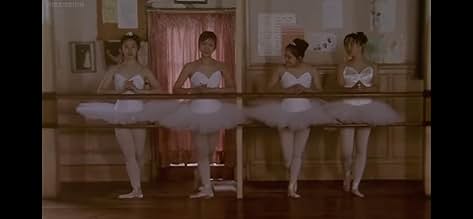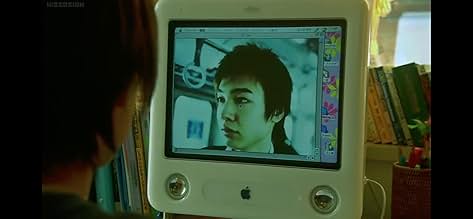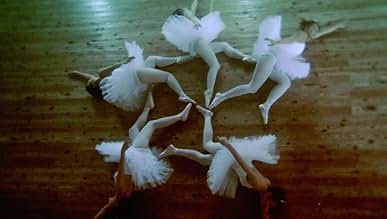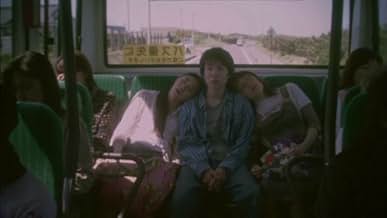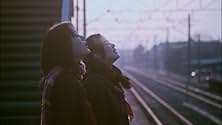Hana to Arisu
- 2004
- 2h 15min
VALUTAZIONE IMDb
7,2/10
5213
LA TUA VALUTAZIONE
Quando due migliori amici si innamorano dello stesso ragazzo, sviluppano un piano per indurlo a uscire con loro.Quando due migliori amici si innamorano dello stesso ragazzo, sviluppano un piano per indurlo a uscire con loro.Quando due migliori amici si innamorano dello stesso ragazzo, sviluppano un piano per indurlo a uscire con loro.
- Regia
- Sceneggiatura
- Star
- Premi
- 1 vittoria in totale
Recensioni in evidenza
From the dark world of junior high school boys in "All about Lily Chou-chou", Iwai has shifted to the lighter world of two high school girls.
Hana and Alice are best friends who do everything together. Alice is the leader of the pair, so it is no surprise when Hana follows her on an early morning expedition to the train station where Alice's latest crush gets the train in to school. Alice soon tires of her crush, but Hana meanwhile has fallen for the crush's "younger brother" Miyamoto and continues the trek to the station by herself.
When the two matriculate at the high school that Miyamoto already attends, Hana enters the rakugo (traditional comedic storytelling) club of which Miyamoto is one of two members. And when one day Miyamoto takes a nasty blow to the head she enters into a crazy scheme to get him to fall in love with her.
Alice, meanwhile, has troubles of her own dealing with a flighty mother, a father she rarely sees, and trying to find herself through a series of acting and modeling auditions after being scouted on the streets of Tokyo. And when she gets roped in to Hana's scheme she finds that Miyamoto is falling for her instead, and her relationship with Hana may be threatened.
The two main characters are real and appealing, neither is one-dimensional. Miyamoto is less interesting, and his motivation less clear. The visuals, as usual, are beautiful especially the frozen fields, cherry blossom lanes, and the ballet scenes. Music always plays an important part in Iwai films (especially Swallowtail and Lily Chou-chou), and the music in this one is very good (composed this time by Iwai himself)... but there are points where it is hard to tell which is the focus, the music or the story. Sometimes it seems that the movie is there to complement the music, and not the other way around.
Also the story has a tendency to wander, and may seem long to someone looking for a straight forward love/friendship story.
Personally I enjoyed the film... and found it got better on repeated viewings... I found Aoi Yu and Suzuki Anne very easy to relate to, recalling the confusion, insecurities, etc of high school days. It is one of Iwai's more comedic pieces, and at the same time subtly moving. It was not overly simplistic or clear cut. And I especially enjoyed Aoi's ballet solo toward the end of the film (both for the solo itself and it's place in the story) I think that fans of Iwai's style will enjoy it.
Keep an eye out for the many cameos (Hirosue Ryoko (of ARITA), Osawa Takao (of Lily Chou-chou), Ito Ayumi (of Swallowtail and Lily Chou-chou)... Abe Hiroshi, Yoshioka Hidetaka (voice only)... and many others)
Hana and Alice are best friends who do everything together. Alice is the leader of the pair, so it is no surprise when Hana follows her on an early morning expedition to the train station where Alice's latest crush gets the train in to school. Alice soon tires of her crush, but Hana meanwhile has fallen for the crush's "younger brother" Miyamoto and continues the trek to the station by herself.
When the two matriculate at the high school that Miyamoto already attends, Hana enters the rakugo (traditional comedic storytelling) club of which Miyamoto is one of two members. And when one day Miyamoto takes a nasty blow to the head she enters into a crazy scheme to get him to fall in love with her.
Alice, meanwhile, has troubles of her own dealing with a flighty mother, a father she rarely sees, and trying to find herself through a series of acting and modeling auditions after being scouted on the streets of Tokyo. And when she gets roped in to Hana's scheme she finds that Miyamoto is falling for her instead, and her relationship with Hana may be threatened.
The two main characters are real and appealing, neither is one-dimensional. Miyamoto is less interesting, and his motivation less clear. The visuals, as usual, are beautiful especially the frozen fields, cherry blossom lanes, and the ballet scenes. Music always plays an important part in Iwai films (especially Swallowtail and Lily Chou-chou), and the music in this one is very good (composed this time by Iwai himself)... but there are points where it is hard to tell which is the focus, the music or the story. Sometimes it seems that the movie is there to complement the music, and not the other way around.
Also the story has a tendency to wander, and may seem long to someone looking for a straight forward love/friendship story.
Personally I enjoyed the film... and found it got better on repeated viewings... I found Aoi Yu and Suzuki Anne very easy to relate to, recalling the confusion, insecurities, etc of high school days. It is one of Iwai's more comedic pieces, and at the same time subtly moving. It was not overly simplistic or clear cut. And I especially enjoyed Aoi's ballet solo toward the end of the film (both for the solo itself and it's place in the story) I think that fans of Iwai's style will enjoy it.
Keep an eye out for the many cameos (Hirosue Ryoko (of ARITA), Osawa Takao (of Lily Chou-chou), Ito Ayumi (of Swallowtail and Lily Chou-chou)... Abe Hiroshi, Yoshioka Hidetaka (voice only)... and many others)
"Hana & Alice" began as a series of shorts to promote Nestle's Kit-Kat candy bars. Through the genius of director Shunji Iwai, this evolved into not just a feature film but a darned profound one. In the DVD features he talks about how much of the movie was improvised, but it doesn't show. The end result is a very thoughtful, seemingly carefully-planned, poetic view of friendship, memories, and our individual yearnings for things that are out of our grasp.
The plot itself is very cute and interesting: a girl conspires to snatch a boyfriend by convincing the boy that he has amnesia and is in love with her. He's just dense enough to fall for it. But things get tricky when he starts asking questions, causing the girl to enlist the help of her best friend in deceiving him. It's a great comedy of Shakespearean proportions, but what makes it particularly fun to watch is the gorgeous way in which it's told.
If you're unfamiliar with the works of Shunji Iwai, this is a great place to start. He is a great, artistic director who does not necessarily get bogged down in poetry beyond the realm of mere mortals such as us. In other words, he has a unique visionary style that's not pretentious or overly "experimental". If I were to sum up his style in one sentence, it would be that he allows the scene to speak for itself without too many camera theatrics. You can expect to see long scenes without disruptive cuts, without much camera motion or with a simple, graceful, linear camera movement following the actors rather than jumpy "MTv editing". This is actually an approach used by several great Japanese directors I've seen, like Hideaki Anno ("Ritual") and Takeshi Kitano ("Fireworks", "Kikujoro") and perhaps it is derived from the master Kurosawa himself.
Something else worth noting is that the director composed all the music himself, furthering the idea that the presentation we get is very lucid and consistent with itself. The music compliments each scene as if telling the story, as opposed to background filler.
While the plot may seem straightforward, there's actually quite a lot of complexity under the surface. Each character is driven by some inner yearning, and their actions are not necessarily clear until you discover what drives each person. Thus, things remain unpredictable until the end, when you get a chance to digest why each person is the way they are.
There's fantastic acting all around, and both Anne Suzuki ("Hana") and Yû Aoi ("Alice") get a chance to shine. Hana's moment is in a powerful monologue near the end, while Alice's moment is in a gorgeous ballet routine which will stun you into silence.
Much like German director Wim Wenders' film "Lisbon Story" which began as a promotional spot for the city of Lisbon yet evolved into a poetic masterpiece, Shunji Iwai's "Hana & Alice" is just about the best candy bar commercial you'll ever see in your life.
The plot itself is very cute and interesting: a girl conspires to snatch a boyfriend by convincing the boy that he has amnesia and is in love with her. He's just dense enough to fall for it. But things get tricky when he starts asking questions, causing the girl to enlist the help of her best friend in deceiving him. It's a great comedy of Shakespearean proportions, but what makes it particularly fun to watch is the gorgeous way in which it's told.
If you're unfamiliar with the works of Shunji Iwai, this is a great place to start. He is a great, artistic director who does not necessarily get bogged down in poetry beyond the realm of mere mortals such as us. In other words, he has a unique visionary style that's not pretentious or overly "experimental". If I were to sum up his style in one sentence, it would be that he allows the scene to speak for itself without too many camera theatrics. You can expect to see long scenes without disruptive cuts, without much camera motion or with a simple, graceful, linear camera movement following the actors rather than jumpy "MTv editing". This is actually an approach used by several great Japanese directors I've seen, like Hideaki Anno ("Ritual") and Takeshi Kitano ("Fireworks", "Kikujoro") and perhaps it is derived from the master Kurosawa himself.
Something else worth noting is that the director composed all the music himself, furthering the idea that the presentation we get is very lucid and consistent with itself. The music compliments each scene as if telling the story, as opposed to background filler.
While the plot may seem straightforward, there's actually quite a lot of complexity under the surface. Each character is driven by some inner yearning, and their actions are not necessarily clear until you discover what drives each person. Thus, things remain unpredictable until the end, when you get a chance to digest why each person is the way they are.
There's fantastic acting all around, and both Anne Suzuki ("Hana") and Yû Aoi ("Alice") get a chance to shine. Hana's moment is in a powerful monologue near the end, while Alice's moment is in a gorgeous ballet routine which will stun you into silence.
Much like German director Wim Wenders' film "Lisbon Story" which began as a promotional spot for the city of Lisbon yet evolved into a poetic masterpiece, Shunji Iwai's "Hana & Alice" is just about the best candy bar commercial you'll ever see in your life.
In recent years, Japanese director Shunji Iwai has become the dark poet of adolescence, exhibiting a profound insight into how teenagers think and act, capturing the rhythms of their speech and depicting their not always smooth transitions from being a child to becoming an adult. Iwai's bleak 2001 film All About Lily Chou Chou dramatized the isolation and emotional torment that accompanies teenage bullying and the failure of modern technology to provide an outlet for loneliness. The polar opposite is Hana and Alice, his 2004 film just released on DVD, which shows the sweet, perhaps too innocent side of Japanese high school life without any hint of the turbulence displayed in Lily.
Written and directed by Iwai who also composed the musical score, Hana and Alice is a charming comedy/drama of friendship and conflict between two junior high school girls who fall for the same boy, depicting their gradually developing ability to handle complex emotional situations without the typical coming-of-age clichés. Originally filmed as three shorts for a candy commercial, Hana (Anne Suzuki) and Alice (Yu Aoi) are fifteen year old high school students and best friends. Alice is the more free-spirited and creative of the two, while Hana is more reserved but still quite playful. The two go to school each morning on the train, attend the same ballet classes, and are virtually inseparable.
On the train, they both notice a handsome student, Miyamoto (Tomohiro Kaku), traveling with a tall American-looking boy who they guess is his older brother. Hana, pursuing her new interest, joins the school drama club where Miyamoto just happens to be a member. Following him home after school, Hana watches in horror as Miyamoto, his head buried deep in a book and seemingly oblivious to the world around him, walks headfirst into a garage door and is knocked unconscious. Seizing the opportunity after coming to his aid, she tells him that his accident has caused him to forget that she is his girlfriend. She solicits Alice's help in pretending to be his ex-girl friend but the more convoluted the lies become, the more strain is put on the girls' relationship, especially when Alice develops strong romantic feelings for Miyamoto.
Hana and Alice is a beautifully filmed and often very funny film that features gorgeous cinematography by the late Noburu Shinoda, magnificent music and ballet sequences, and brilliant performances by Aoi, Suzuki, and Kaku. The film has many memorable moments including an enchanting five-minute ballet sequence, a tearful confession by Hana minutes before she is to go on stage to perform, a glowing photo shoot of the ballet class outside at night, a fight on the beach between the two girls, and Alice's loving visit with her estranged father. While the story is thin and feels stretched over 135 minutes, Iwai's subtle delineation of character and insight into adolescent life makes Hana and Alice a film to cherish.
Written and directed by Iwai who also composed the musical score, Hana and Alice is a charming comedy/drama of friendship and conflict between two junior high school girls who fall for the same boy, depicting their gradually developing ability to handle complex emotional situations without the typical coming-of-age clichés. Originally filmed as three shorts for a candy commercial, Hana (Anne Suzuki) and Alice (Yu Aoi) are fifteen year old high school students and best friends. Alice is the more free-spirited and creative of the two, while Hana is more reserved but still quite playful. The two go to school each morning on the train, attend the same ballet classes, and are virtually inseparable.
On the train, they both notice a handsome student, Miyamoto (Tomohiro Kaku), traveling with a tall American-looking boy who they guess is his older brother. Hana, pursuing her new interest, joins the school drama club where Miyamoto just happens to be a member. Following him home after school, Hana watches in horror as Miyamoto, his head buried deep in a book and seemingly oblivious to the world around him, walks headfirst into a garage door and is knocked unconscious. Seizing the opportunity after coming to his aid, she tells him that his accident has caused him to forget that she is his girlfriend. She solicits Alice's help in pretending to be his ex-girl friend but the more convoluted the lies become, the more strain is put on the girls' relationship, especially when Alice develops strong romantic feelings for Miyamoto.
Hana and Alice is a beautifully filmed and often very funny film that features gorgeous cinematography by the late Noburu Shinoda, magnificent music and ballet sequences, and brilliant performances by Aoi, Suzuki, and Kaku. The film has many memorable moments including an enchanting five-minute ballet sequence, a tearful confession by Hana minutes before she is to go on stage to perform, a glowing photo shoot of the ballet class outside at night, a fight on the beach between the two girls, and Alice's loving visit with her estranged father. While the story is thin and feels stretched over 135 minutes, Iwai's subtle delineation of character and insight into adolescent life makes Hana and Alice a film to cherish.
Iwai's tale of friendship and love among 15-year-olds is a bitter-sweet affair, joyous and poignant in fragments. It is not a perfect film, but still imbued with enough of Iwai's visual flair and inventiveness to raise it above much of what Japan has offered up in the first decade of the 21st century.
Hana (Anne Suzuki) is inadvertently brought to Ma-kun by her best friend Alice (Yû Aoi). She utilizes an accident to convince clumsy Ma-kun (Tomohiro Kaku) that he has lost his memory and that she is the love of his life. The lie grows out of control, and sucks in the best friend. Alice, meanwhile, has her own troubles to contend with, namely an eccentric mother, disinterested father, and an acting/modeling opportunity that continually misfires.
Like Iwai's 'Love Letter', the essentials of the plot are intricately laid out, but ultimately matter less than the shot-by-shot, scene-by-scene poetry conjured up by camera, light and direction. There is one breathtaking shot in a classroom, when Astro Boy is revealed watching brazenly over a lover's tiff. The manga motif serves to underline the heightened emotions and extreme dramatics of the tale. Similar optical playfulness is employed when Hana watches Ma-kun on the train, seemingly in conversation with his girlfriend. That shot is matched later when we are optically fooled into thinking Ma-kun will kiss Alice. It is this continual ability to surprise and delight that means the 2-hour plus running time, while self-indulgent, manages not to feel too much of an imposition.
There are some wonderful set pieces to celebrate here. Alice's father making a complete mess of gifting his daughter a fountain pen is painful and hilarious. Ditto Hana's mother appearing in her undies before a shell-shocked Ma-kun. A klutzy classmate's photos of the girls in ballet tutus turn out to be magical. These scenes, stagy and contrived in the hands of a lesser mortal, are fluid, vivid and delightful when presented by Iwai.
It is testament to Iwai's genius that a host of A-listers line up for walk-on parts in this film. For example, Hirsohi Abe, used to playing leads, is practically an extra here when he shows up as the boyfriend of Alice's mum. What other living director elicits such reverence? Hana and Alice glows, quite literally. The film captures that vividness of passionate friendships and love first encountered that only the qualia of a 15-year-old knows. Ultimately, the running time is a shade too flabby to count it among Iwai's masterpieces (the plural is deliberate), but this is a subtle, complex film worthy of repeat viewing.
Hana (Anne Suzuki) is inadvertently brought to Ma-kun by her best friend Alice (Yû Aoi). She utilizes an accident to convince clumsy Ma-kun (Tomohiro Kaku) that he has lost his memory and that she is the love of his life. The lie grows out of control, and sucks in the best friend. Alice, meanwhile, has her own troubles to contend with, namely an eccentric mother, disinterested father, and an acting/modeling opportunity that continually misfires.
Like Iwai's 'Love Letter', the essentials of the plot are intricately laid out, but ultimately matter less than the shot-by-shot, scene-by-scene poetry conjured up by camera, light and direction. There is one breathtaking shot in a classroom, when Astro Boy is revealed watching brazenly over a lover's tiff. The manga motif serves to underline the heightened emotions and extreme dramatics of the tale. Similar optical playfulness is employed when Hana watches Ma-kun on the train, seemingly in conversation with his girlfriend. That shot is matched later when we are optically fooled into thinking Ma-kun will kiss Alice. It is this continual ability to surprise and delight that means the 2-hour plus running time, while self-indulgent, manages not to feel too much of an imposition.
There are some wonderful set pieces to celebrate here. Alice's father making a complete mess of gifting his daughter a fountain pen is painful and hilarious. Ditto Hana's mother appearing in her undies before a shell-shocked Ma-kun. A klutzy classmate's photos of the girls in ballet tutus turn out to be magical. These scenes, stagy and contrived in the hands of a lesser mortal, are fluid, vivid and delightful when presented by Iwai.
It is testament to Iwai's genius that a host of A-listers line up for walk-on parts in this film. For example, Hirsohi Abe, used to playing leads, is practically an extra here when he shows up as the boyfriend of Alice's mum. What other living director elicits such reverence? Hana and Alice glows, quite literally. The film captures that vividness of passionate friendships and love first encountered that only the qualia of a 15-year-old knows. Ultimately, the running time is a shade too flabby to count it among Iwai's masterpieces (the plural is deliberate), but this is a subtle, complex film worthy of repeat viewing.
Hana and Alice are good friends and they do everything together. They go to the same high school and they go to school together. One day Hana falls in love with a boy who goes to the same high school. Hana deceives the boy and gets him. However, the boy loves Alice and Alice also loves him. What will happen to the relationship of the three.
I have a lot of friends but I don't have friends like Hana and Alice. They are always together and they say everything each other. They look happy and I think it is good thing. However friends sometimes become rivals. In this movie, Hana and Alice love the same man and they become rivals each other. I think moderate distance is important. We can share glad feeling or sad experience with our friends, but not interfere deeply. By watching this movie, we can rethink about the relationships with our friends.
I have a lot of friends but I don't have friends like Hana and Alice. They are always together and they say everything each other. They look happy and I think it is good thing. However friends sometimes become rivals. In this movie, Hana and Alice love the same man and they become rivals each other. I think moderate distance is important. We can share glad feeling or sad experience with our friends, but not interfere deeply. By watching this movie, we can rethink about the relationships with our friends.
Lo sapevi?
- QuizAlthough released almost 11 years before Hana e Alice: il caso di omicidio (2015), this movie actually serves as the sequel.
- Citazioni
Setsuko "Alice" Arisugawa: I saw 'Hannibal' on satellite last night.
Hana: So did I.
Setsuko "Alice" Arisugawa: I was scared.
Hana: Isn't he creepy?
Setsuko "Alice" Arisugawa: Yeah. Don't you think real people are scarier... than zombies and ghosts?
- ConnessioniFeatures La grande avventura del piccolo principe Valiant (1968)
I più visti
Accedi per valutare e creare un elenco di titoli salvati per ottenere consigli personalizzati
- How long is Hana and Alice?Powered by Alexa
Dettagli
Botteghino
- Lordo in tutto il mondo
- 654.448 USD
Contribuisci a questa pagina
Suggerisci una modifica o aggiungi i contenuti mancanti


